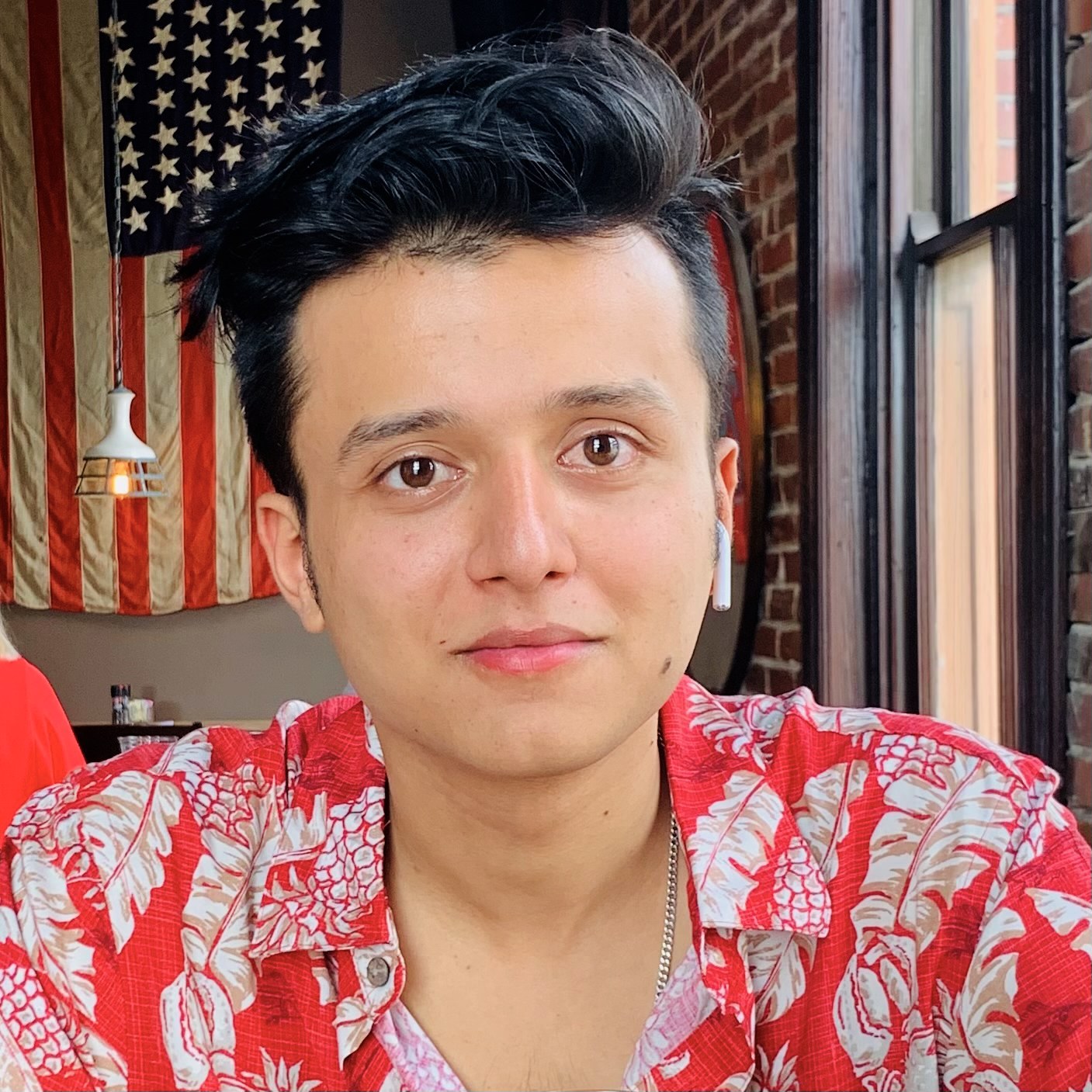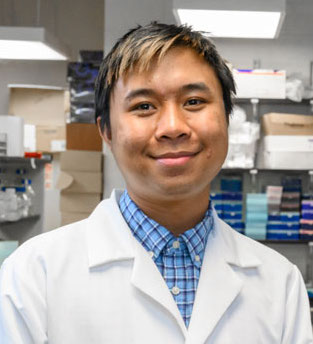Our Team
 Dr. Xuegeng Wang (王学耕)
Dr. Xuegeng Wang (王学耕)
Adjunct Assistant Professor of Biology
Currently at South China Normal University
Biosketch
Google Scholar Profile
GRADUATE STUDENTS
1) Megan Doldron, Spring 2017 ~ Spring 2022

Megan Doldron is a native of the beautiful twin islands of Trinidad and Tobago. She earned her Bachelor’s degree at Hollins University in Roanoke Virginia with a double major in Biology and Dance and a minor in Psychology. She then earned a Masters in Biology Education at North Carolina A&T State University where she was awarded the North Carolina A&T State University Graduate Fellowship 2014-2015. Megan then taught high school Biology for 3 years at Reidsville High where she was awarded Teacher of the Year in her 2nd year. She then decided to return to school and pursued and earned her Master of Science in Biology at North Carolina A&T State University. Her research focused on natural alternatives such as antioxidant-rich plants and how they can reduce the signs of airway inflammation and oxidative stress caused by exposure to dust from a swine confinement facility. She is currently enrolled in the Ph.D. program where her research is focused on epigenetic effects cannabinoid exposure in the lungs and whole body system using in vitro mono- and co-culture methods and in vivo animal models.
Manuscripts
- Transcriptomic alterations associated with delta-9 THC exposure in the human bronchial epithelial cells in vitro. Cell Biology and Toxicology (in preparation)
- Cellular and epigenetic effects of chronic THC exposure on bronchial epithelial cells in vitro. Cell Biology and Toxicology (in preparation)
- Adverse effects of cannabinoid exposure on bronchial cells- a review. (in preparation)
Presentations
- Doldron, M., Jia, Z., Bhandari, RK. Epigenetic Effects of Cannabinoid Exposure on Bronchial Epithelial Cells. Triangle. Second Annual Chromatin and Epigenetics Symposium. December 6, 2018. UNC Chapel Hill
- Doldron, M., Jia, Z., Bhandari, RK. 58th Annual Meeting of the Society of Toxicology. Epigenetic effects of cannabinoids on bronchial epithelial cells in vitro. March 10-14, 2019. (Megan Doldron, Graduate student, poster presentation)
1) Sourav Chakraborty, Fall 2019~present

Sourav joined the laboratory in August 2019 as an EHS I Ph.D. student. He completed his Master of Science degree in biology from Southeast Missouri State University, Cape Girardeau, MO in July 2019. His research is focused on mechanisms underlying the epigenetic inheritance of bisphenol A-induced non-alcoholic fatty liver disease (NAFLD). He is using molecular, cellular, next-generation sequencing of transcriptome and methylome and bioinformatic approaches to unravel epigenetic and genetic processes associated with the onset and progression of NAFLD in medaka fish liver.
Manuscripts
- Chakraborty, S., Wang, X., Dissanayake, M., Godwin, J., Bhandari, R.K. (2023). Ancestral BPA exposure caused defects in the liver of medaka for four generations. Science of the Total Environment. 856 (1). 159067.
- Chakraborty, S., Coe, S., Reh, B., Bhandari, R.K. (2023). The PCOS–NAFLD multidisease phenotype occurred in medaka fish four generations after the removal of bisphenol A exposure. Environ. Sci. Technol. 57 (34): 12602–12619
- Chakraborty, S., Anand, S., Todd, D., Bhandari, R.K. (2023). Integrated metabolomic and transcriptomic analyses identified sex-specific alterations in livers associated with ancestral bisphenol A exposure.in preparation
- Chakraborty, S., Anand, S., Todd, D., Bhandari, R.K. (2023). Metabolomic changes in the gut-liver-gonad axis of medaka fifth generation offspring with a history of ancestral bisphenol A exposure.
- Chakraborty, S., Anand, S., Bhandari, R.K. (2023). Methylome and transcriptional alterations in the liver of the third and fifth generation medaka with a history of ancestral bisphenol A exposure.
- Chakraborty, S., Anand, S., Bhandari, R.K. (2023). Correction of transgenerational epimutations to ameliorate transgenerational non-alcoholic fatty liver disease. in preparation
Presentations
- Chakraborty, S., Wang, X., Godwin, J., Bhandaari, R.K. (2021).Transgenerational non-alcoholic fatty liver disease in medaka, Oryzias latipes grandchildren caused by grandparental bisphenol exposure. 42nd Annual Meeting of the Society of Environmental Toxicology and Chemistry (SETAC). Portland, OR. November 14-18, 2021.
1) Gaurav Phuyal, Fall 2021~present
 Gaurav will join the Bhandari Lab in August 2021 as a graduate student (MS program). His research project is to develop a CRISPR-dCas9 epigenome tool to correct DNA methylation and histone epimutations in medaka. He is expected to graduate in May 2023.
Gaurav will join the Bhandari Lab in August 2021 as a graduate student (MS program). His research project is to develop a CRISPR-dCas9 epigenome tool to correct DNA methylation and histone epimutations in medaka. He is expected to graduate in May 2023.
1) Seraiah Coe, Fall 2021~present
 Seraiah will join the Bhandari Lab in August 2021 as a graduate student (MS program). Her research project is to examine health risks of the individuals with a history of ancestral exposure upon exposure to chemicals of emerging concern (CECs). She will re-expose our medaka fish who have pre-existing epimutations to CECs and evaluate their health.
Seraiah will join the Bhandari Lab in August 2021 as a graduate student (MS program). Her research project is to examine health risks of the individuals with a history of ancestral exposure upon exposure to chemicals of emerging concern (CECs). She will re-expose our medaka fish who have pre-existing epimutations to CECs and evaluate their health.
UNDERGRADUATE STUDENTS
1) Beh Reh, Spring 2020~ present
 Beh is a junior NSF-STAMPS-funded student at UNCG. His research project is focused on perchlorate-induced mitochondrial dysfunction and energy metabolism in medaka germ stem cells.
Beh is a junior NSF-STAMPS-funded student at UNCG. His research project is focused on perchlorate-induced mitochondrial dysfunction and energy metabolism in medaka germ stem cells.
Manuscripts
- Reh, B., **Feng, Y., ‡Wang, X., Bhandari, R.K. (2022). Effects of potassium perchlorate exposure on primordial germ cells of medaka fish. Aquatic Toxicology: 106283. https://doi.org/10.1016/j.aquatox.2022.106283
- Reh, B., Chakraborty, S., Feng, Y., Bano, N., Anand, S., Bhandari, R.K. (2022). Paternal potassium perchlorate exposure led to altered testicular morphology, testis transcriptome, and sperm methylome in reproductively active medaka.In preparation.
Presentations
- Reh, B., Wang, X., Feng, Y., Bhandari, R.K. Effects of perchlorate exposure on developing medaka, Oryzias latipes and their primordial germ cells. Triangle Consortium of Reproductive Biology (TCRB). Virtual. February 26, 2021.
- Reh, B., Wang, X., Feng, Y., Bhandari, R.K. Effects of perchlorate exposure on developing medaka, Oryzias latipes and their primordial germ cells. Biennial Conference of North American Society of Comparative Endocrinology (NASCE). Virtual. May 25-27, 2021.
- Reh, B., Wang, X., Feng, Y., Bhandari, R.K. Effects of perchlorate exposure on developing medaka, Oryzias latipes and their primordial germ cells. 42nd Annual Meeting of the Society of Environmental Toxicology and Chemistry (SETAC). Portland, OR. November 14-18, 2021.
- Reh, B., Chakraborty, S., Bano, N., Bhandari, R.K. Transcriptional alterations induced by potassium perchlorate exposure in the adult medaka testis. 43rd Annual Meeting of the Society of Environmental Toxicology and Chemistry (SETAC). Pittsburg, PA. November 13-17, 2022.
2) Ahmad Romero, Fall 2020~Spring 2022
 Ahmad is working on the mitigation of external stimuli-induced epigenetic effects in human bronchial cells by epigenetic writers and erasures.
Ahmad is working on the mitigation of external stimuli-induced epigenetic effects in human bronchial cells by epigenetic writers and erasures.
3) Morgan Rector, Spring 2021~Spring 2022
 Morgan is currently working on research techniques required for validating CRISPR-dCas9 epigenome editing.
Morgan is currently working on research techniques required for validating CRISPR-dCas9 epigenome editing.
4) Verdant Julius, Spring 2021~Spring 2022
 Verdant is currently working on research techniques required for histological characterization of tissue phenotypes.
Verdant is currently working on research techniques required for histological characterization of tissue phenotypes.
5) Coryanna Jefferies, Spring 2021~Spring 2022
 Coryanna is working with Megan Doldron on effects of cannabinoids in human bronchial epithelial cells.
Coryanna is working with Megan Doldron on effects of cannabinoids in human bronchial epithelial cells.





